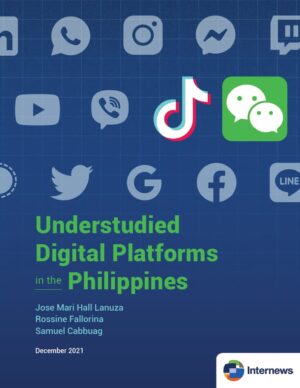Read the Report
The past decade has shown that there is no silver bullet to address disinformation, and that tackling the pollution of the public discourse by online disinformation requires a multi-pronged, multi-stakeholder approach.
Internews’ work on disinformation in the Philippines aims at uniting the strengths of stakeholders in the media community, civil society, academia, private sector, and social media companies, along six axes: factchecking and myth busting, media and information literacy, public policy advocacy, disinformation investigation, investment in trustworthy news and media, and algorithm accountability.
The latter requires to understand the role each social media platform plays in the information ecosystem, to tailor specific strategies of engagement on and with these platforms.
In that context, the Understudied Digital Platforms in the Philippines (UDPP) research project sought to understand the role of lesser-known digital platforms, such as TikTok and WeChat, in the Philippine information environment and draw out strategies to mitigate disinformation among their users.
Internews worked with three researchers Jose Mari Hall Lanuza (University of the Philippines, Manila) and Rossine Fallorina and Samuel Cabbuag (University of the Philippines, Diliman) to conduct an Information Ecosystem Assessment (IEA) to look deeper into the role that these platforms play in the media and digital landscape, what their current and future impact may be, and where information actors need to focus their attention.
The research provides an in-depth dive into these platforms, examining their affordances, information flows, user demographics, and disinformative potential. The research also offers preliminary recommendations for platforms, policymakers, and public stakeholders to establish regulated but democratic online public spheres within these platforms.
